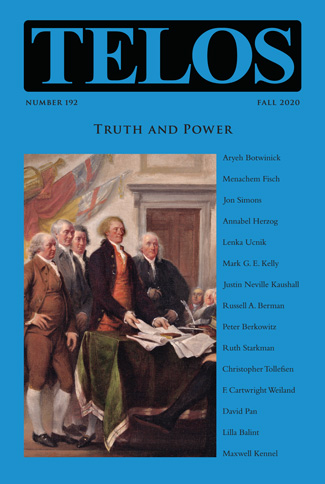Telos 192 (Fall 2020): Truth and Power is now available for purchase in our store. Individual subscriptions to Telos are also available in both print and online formats.
 There is a strong temptation to oppose the idealism of truth to the realism of power in order to criticize and turn away from politics as a base pursuit. Science, facts, and ideals are cited as the objective truths that so often are ignored in favor of ideology, lies, and self-interest by those who wield power. Yet this opposition between truth and power can itself become a dubious tactic, as it is often the speaker who seeks to define an opinion as truth. This situation is complicated by the circumstance that there are three forms of truth that are often merged in such discussions.
There is a strong temptation to oppose the idealism of truth to the realism of power in order to criticize and turn away from politics as a base pursuit. Science, facts, and ideals are cited as the objective truths that so often are ignored in favor of ideology, lies, and self-interest by those who wield power. Yet this opposition between truth and power can itself become a dubious tactic, as it is often the speaker who seeks to define an opinion as truth. This situation is complicated by the circumstance that there are three forms of truth that are often merged in such discussions.
First, there are natural scientific truths that even autocrats and totalitarians do not seek to deny, as they are the source of the technological tools that can support any attempt to maintain power. Here, there is certainly no conflict between truth and power. Not only does political power depend on technological achievement, but natural scientific facts cannot be covered up by lies and ideology for long. Consequently, political actors must pay attention to natural scientific and technical knowledge, even if they then instrumentalize it in different ways.


